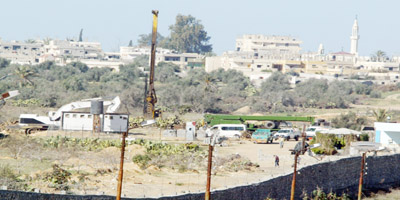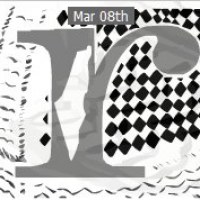Source: Intelligence and Terrorism Information Center.
The Egyptians have begun the construction of an underground wall along the Egypt-Gaza Strip border. The wall, made of steel plates, will be nine kilometers (5.6 miles) long and very deep. It is being built to prevent smuggling from Egypt to the Gaza Strip through the tunnels, an important pipeline for weapons and other commodities entering the Gaza Strip. Large cranes, excavation equipment and many workers have been brought to the site.

Heavy machinery operates on the Egyptian side of the border with the Gaza Strip, as seen from Rafah, southern Gaza Strip on December 19, 2009. Egyptian police have stepped up their presence near the equipment for drilling the steel wall on the border shared between the Gaza Strip and Egypt - website: Felesteen - Photo|Abed Rahim Khatib
The construction of the wall has made the Gazans very afraid that it will cause a lack of basic products, fuel and raw materials, which will turn lead to a rise in prices. Some Gazans have already started hoarding food and raw materials. Palestinian media commentators claim that by constructing the wall, Egypt is trying to pressure the heads of Hamas to sign the internal Palestinian reconciliation document and compromise on the issue of Gilad Shalit (Hamas Al-Risala, December 20, 2009).
The Hamas heads view the wall as a serious blow to the Gazan economy and it may also be assumed that they are concerned it will cause difficulties in smuggling weapons into the Gaza Strip. They therefore asked the Egyptians to freeze the building because, they claim, the Gaza Strip does not threaten Egyptian security in any way:
- Mahmoud al-Zahar, Hamas spokesman in the Gaza Strip, said that Gaza had never been a threat to Egypt and that a team had been appointed (apparently by Hamas) to gather information about the wall. It would present its findings in the coming days (Qatar’s Al-Sharq, December 16, 2009).
- Fawzi Barhoum, Hamas spokesman in the Gaza Strip, said that the wall was being built as part of an American plan devised under President Bush, and that its objective was
to strangle one and half million Palestinians in Gaza.
He said that the Gaza Strip did not threaten Egypt’s security in any way. He also criticized what he called Mahmoud Abbas support for the wall, saying the latter’s remarks support the continuation of thesiege
of the Gaza Strip (Hamas Palestine-Info website, December 19, 2009). - Sami Abu Zuhri, Hamas spokesman in the Gaza Strip, during a Hamas-organized demonstration in Gaza City called for the building of the wall to be stopped, calling it
a steel wall of death
which wouldstrangle the Palestinian people,
and warned of its serious consequences. He also criticized Egypt, which was, he said,abdicating (its) moral and religious responsibility
(Hamas Palestine-Info website, December 22, 2009). - Ihab al-Ghussein, spokesman for the interior ministry of the de facto Hamas administration, also said that the Gaza Strip was not a danger to Egypt. He said the (so-called)
Hamas government
was worried by the construction of the wall which would, he said, increase pressure on the population, which the Hamas government might not be able to withstand or control.
The opposition of Hamas (and other elements in the Gaza Strip) was expressed in various ways:
Egyptian security sources
said that armed Palestinians had shot at the unit constructing the wall, damaging equipment. Egypt declared an emergency security situation and reinforced the area (Ma’an News Agency, December 17, 2009).- On December 12, Hamas called on the Gazan population to participate in a mass rally on the Egyptian border at the Rafah crossing to protest the construction of the wall. Despite the Gazans worries, the turnout was poor and few people participated in the rally.
Several Egyptian newspapers devoted editorials to the danger facing Egypt from the arms smuggling and the tunnels, and stressed Egypt’s right to defend its sovereignty and security. They also criticized Hamas and its accusations that Egypt was participating in the so-called siege
of the Gaza Strip (Ruz Al-Yusuf, Al-Ahram, December 21, 2009).
Mazzeltov,
Crethi Plethi



 RSS
RSS














Latest Comments
Hello Mike, Thank you for your positive feedback to the article. I felt there wasn’t too much critical analysis of ...
Thanks for this considered and well constructed article. A follow up article on the manner in which the editorial contro...
THE CLUELESSNESS OF CLAIMING THAT OBAMA'S MIDDLE EAST POLICIES WERE A FAILURE CANNOT BE FURTHER FROM THE TRUTH, WHAT THE...
As long as Obama is the president of the usa do not trust the us government......
Thank you for an good read....